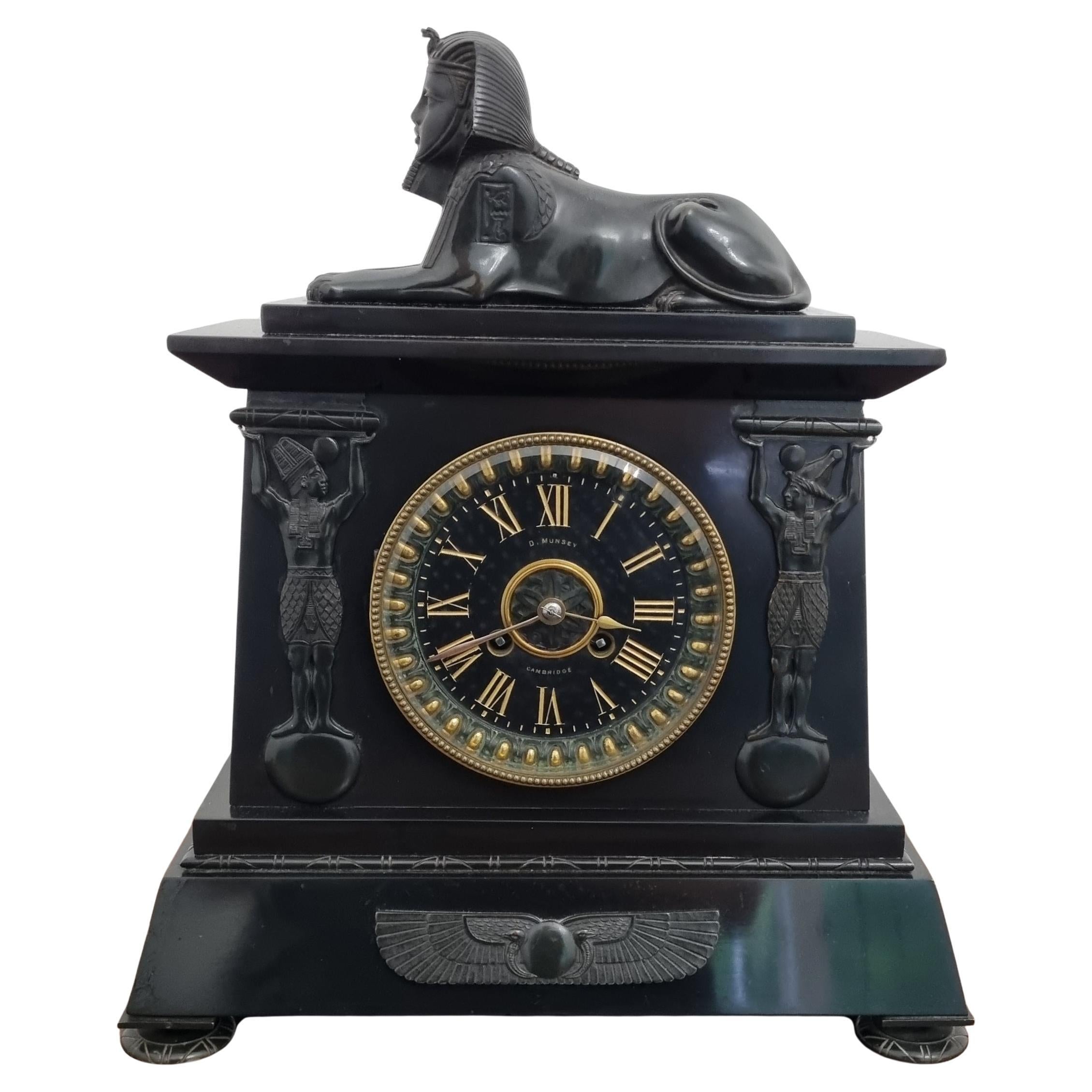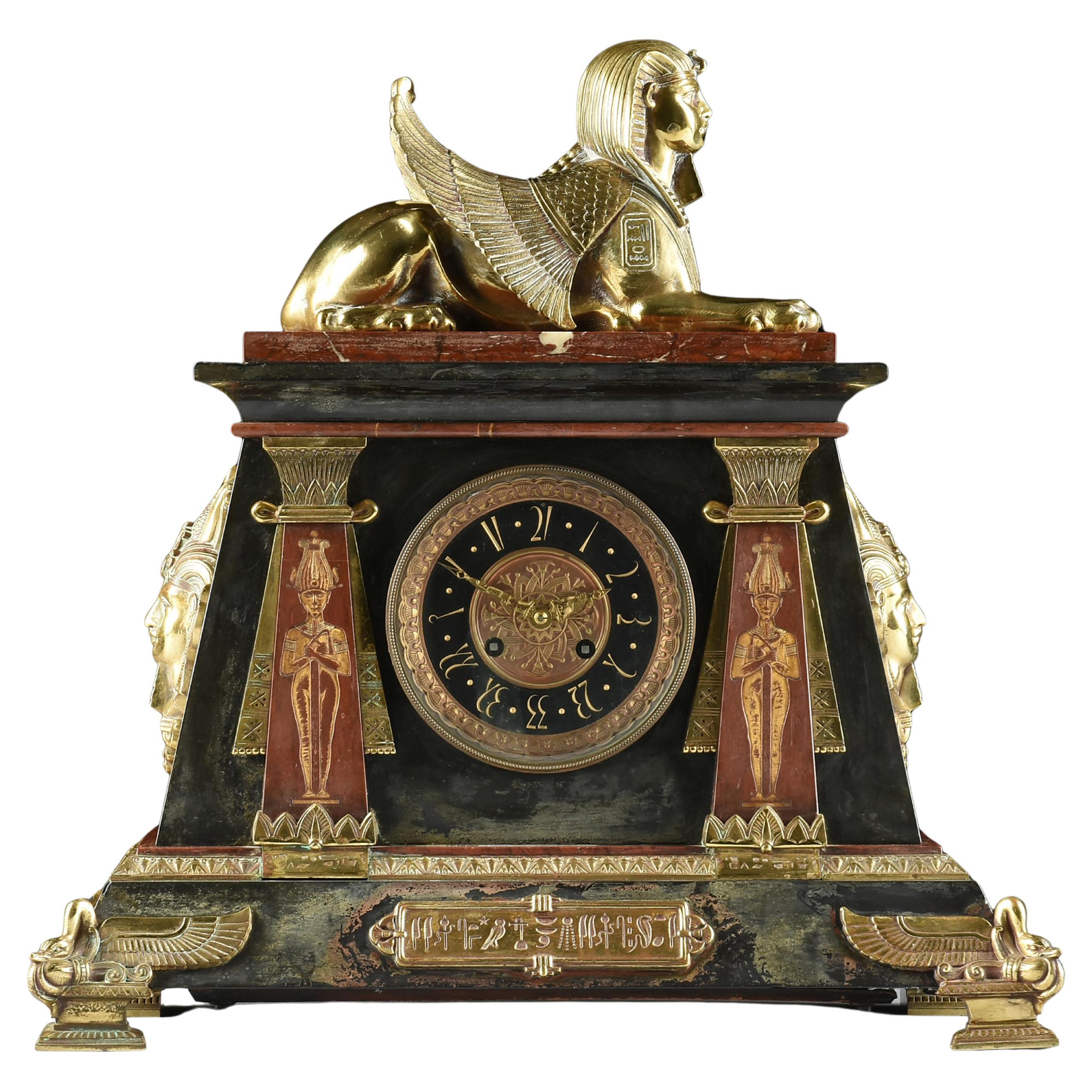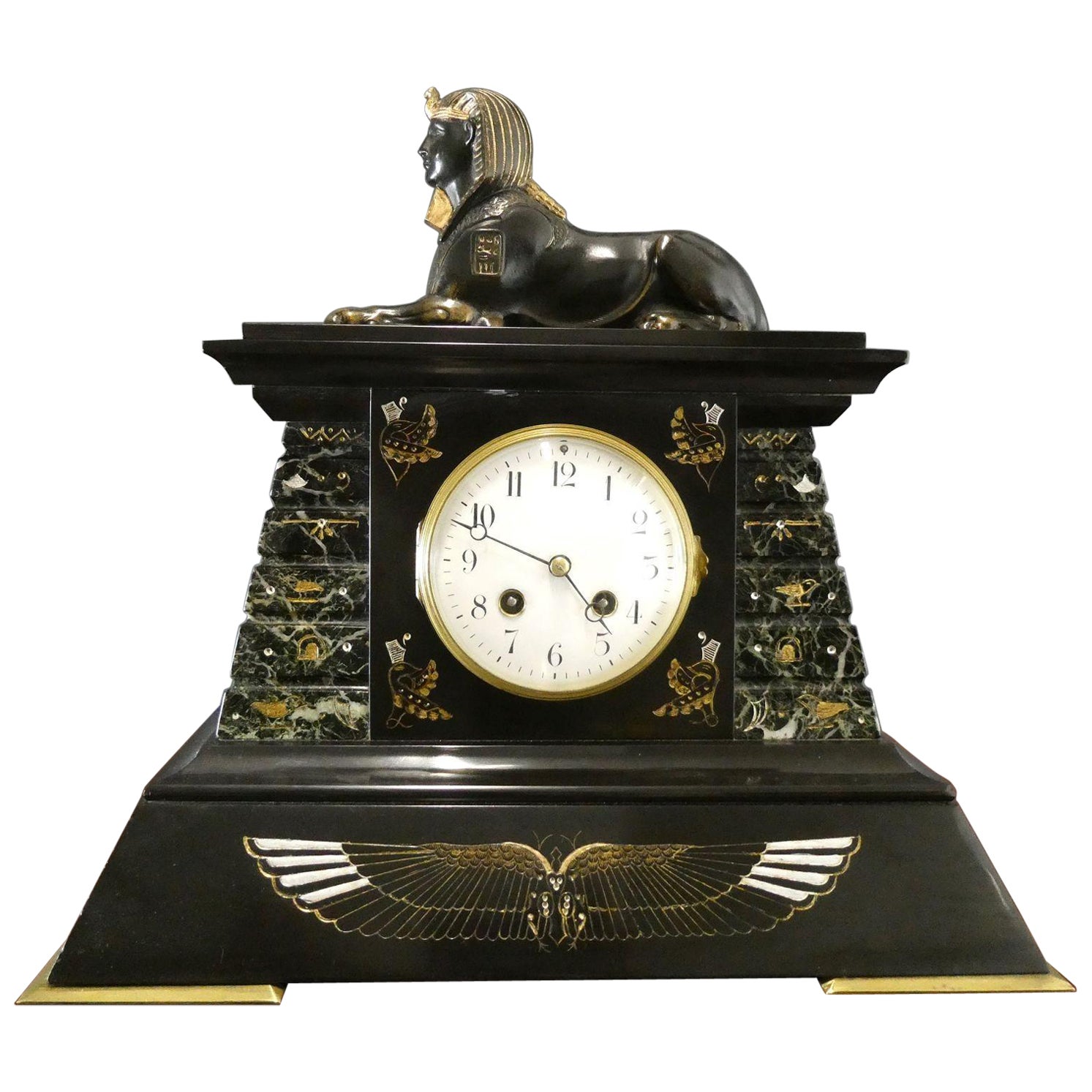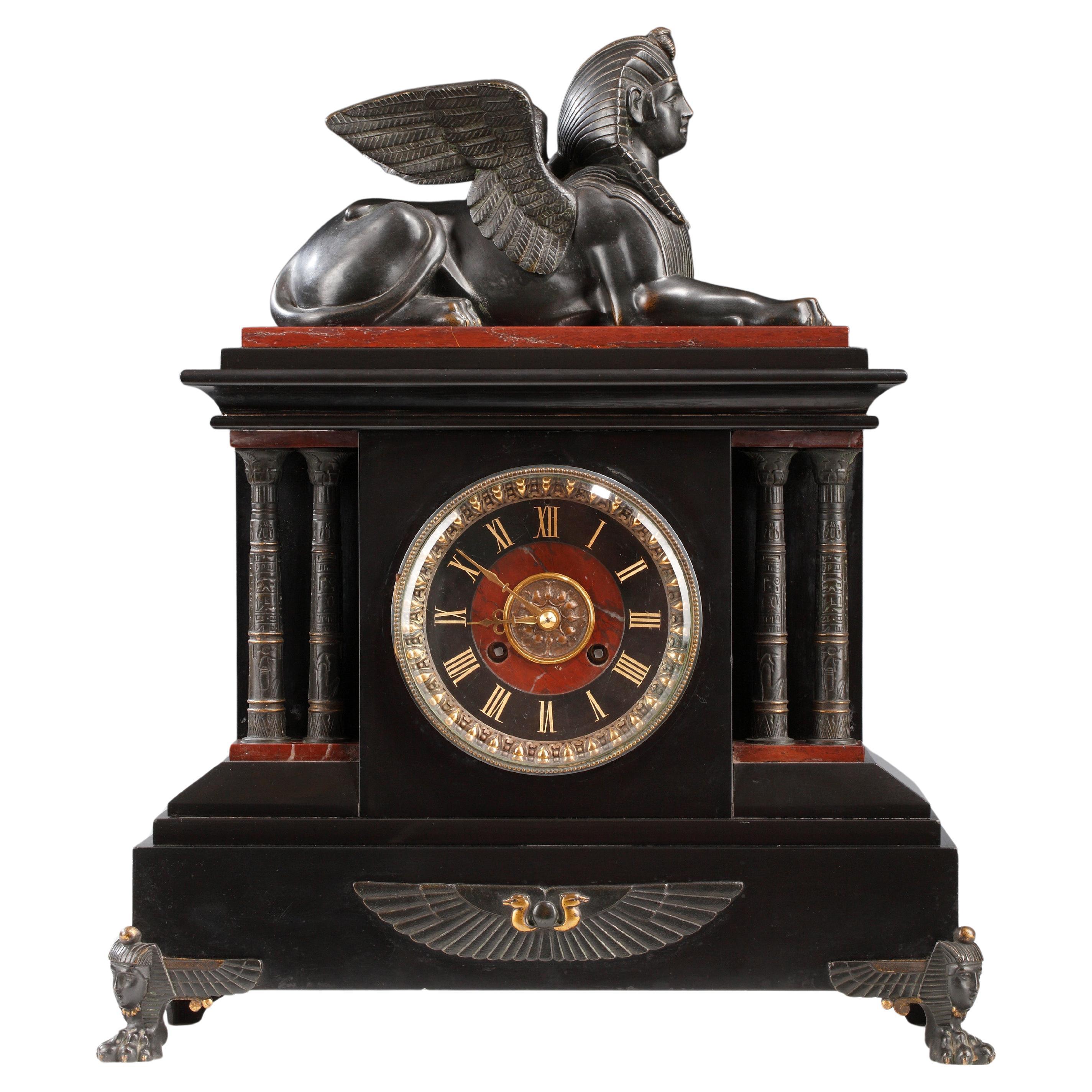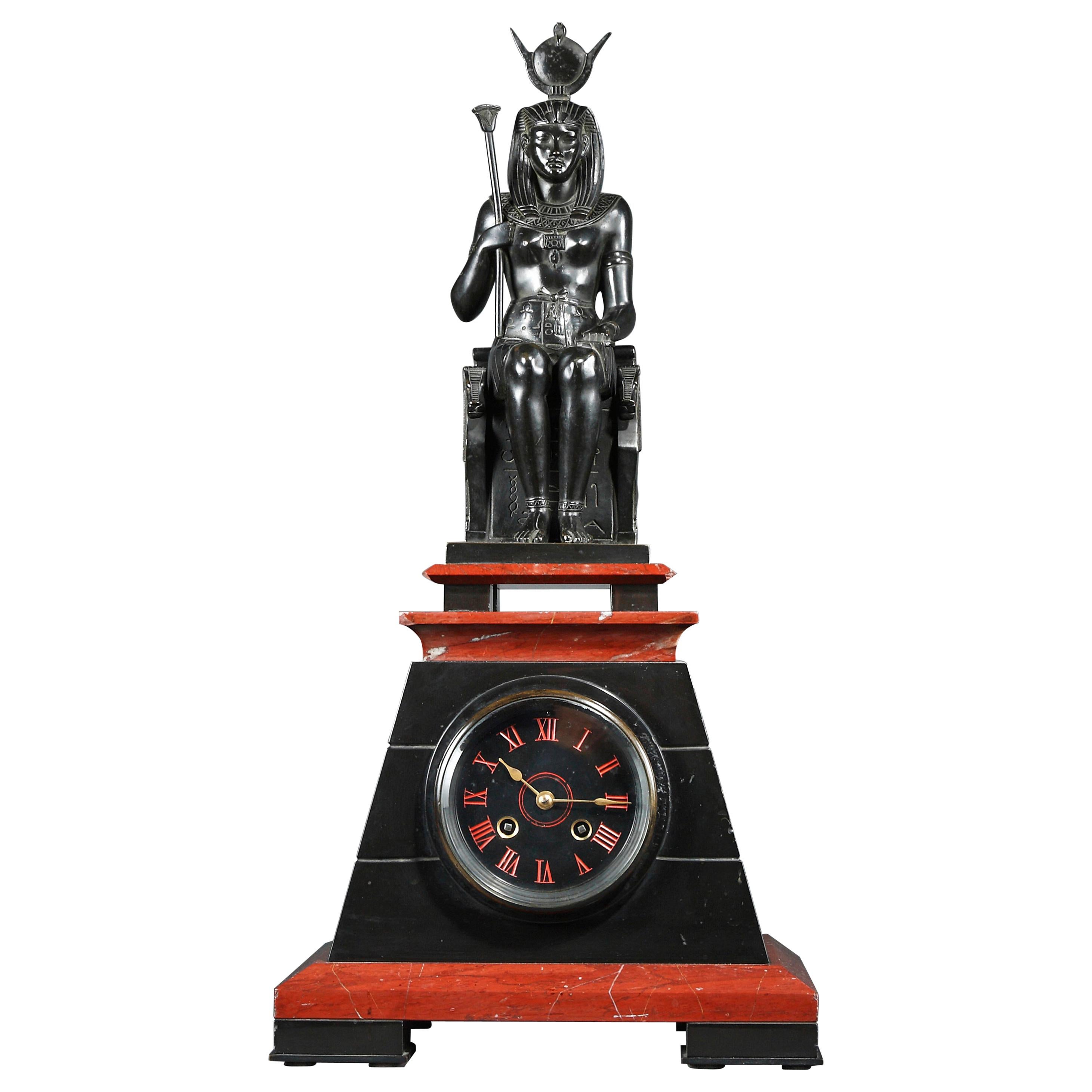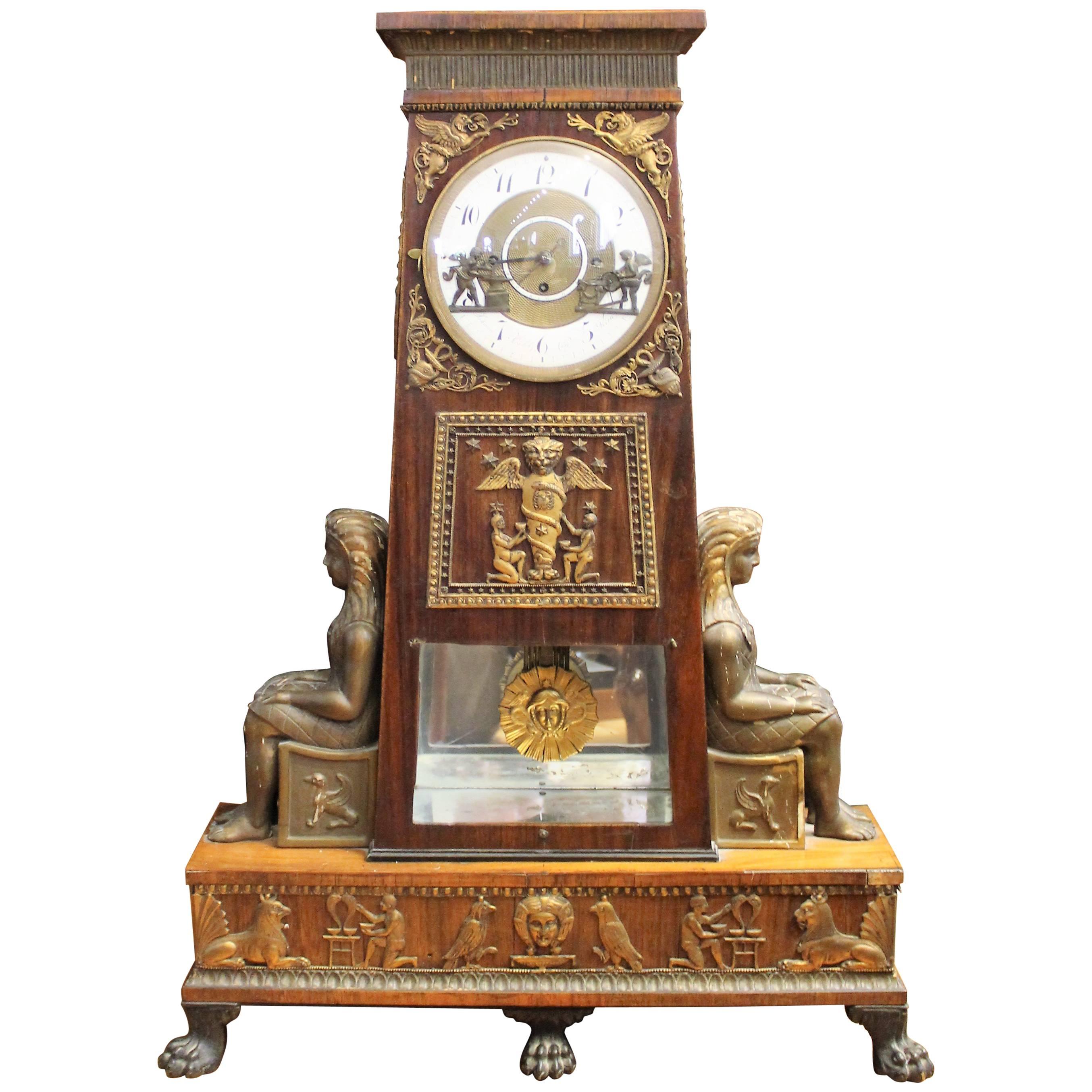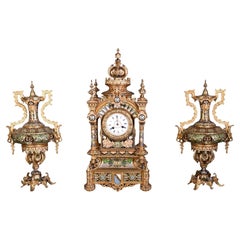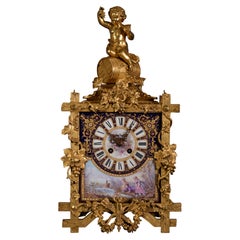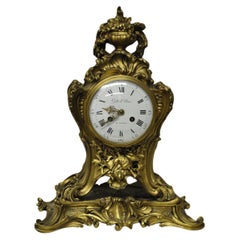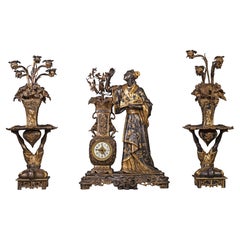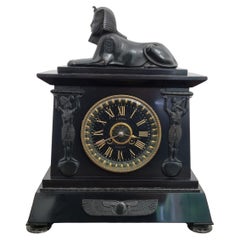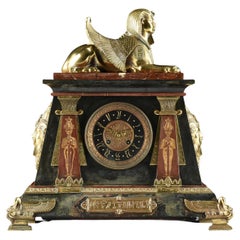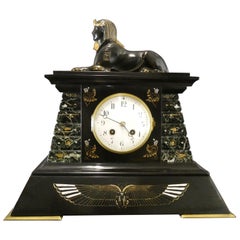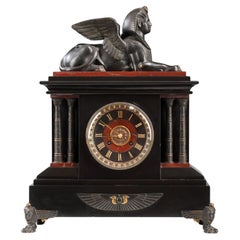Items Similar to Egyptian Revival Mantel Clock, 19th Century
Want more images or videos?
Request additional images or videos from the seller
1 of 18
Egyptian Revival Mantel Clock, 19th Century
$28,528.01
£21,391.10
€24,000
CA$39,807.04
A$43,099.43
CHF 22,913.98
MX$519,808.88
NOK 288,156.27
SEK 268,643.71
DKK 182,834.56
About the Item
Mantel clock in patinated and gilt bronze, with red and black marble, in the Egyptian Revival style of the 19th century.
The composition features a standing female Egyptian figure holding a staff, positioned atop a flared pyramidal base. The circular clock dial is framed by stylized hieroglyphs and topped with a winged sun disk. Two seated sphinxes flank the sides. The piece combines contrasting materials and decorative elements inspired by ancient Egypt.
- Creator:Georges Emile Henri Servant (Artist)
- Dimensions:Height: 29.53 in (75 cm)Width: 6.3 in (16 cm)Depth: 19.3 in (49 cm)
- Style:Egyptian Revival (Of the Period)
- Materials and Techniques:
- Place of Origin:
- Period:
- Date of Manufacture:1870
- Condition:
- Seller Location:SAINT-OUEN-SUR-SEINE, FR
- Reference Number:Seller: 156781stDibs: LU7662244246782
About the Seller
No Reviews Yet
Recognized Seller
These prestigious sellers are industry leaders and represent the highest echelon for item quality and design.
1stDibs seller since 2022
6 sales on 1stDibs
Typical response time: 1 to 2 days
- ShippingRetrieving quote...Shipping from: SAINT-OUEN-SUR-SEINE, France
- Return Policy
More From This Seller
View AllPersian-style double-sided clock and garnitures, Charles Stanislas MATIFAT
By Charles Matifat
Located in SAINT-OUEN-SUR-SEINE, FR
Charles Stanislas Matifat is the creator of this ensemble consisting of a double-sided enameled bronze clock and a matching pair of large garnitures. Dated 1851 and bearing his signa...
Category
Antique 19th Century European Islamic Table Clocks and Desk Clocks
Materials
Bronze, Enamel
Napoleon III Style Clock Made Out of Porcelain and Gilded Bronze
Located in SAINT-OUEN-SUR-SEINE, FR
This beautiful clock was made out of porcelain and gilded bronze during Napoleon III period. The porcelain dial indicates the hours with Roman numerals. It is decorated with gilded r...
Category
Antique 19th Century French Napoleon III Mantel Clocks
Materials
Bronze
Louis XV ormolu clock by Gille l'Ainé
Located in SAINT-OUEN-SUR-SEINE, FR
Beautiful little antique clock in the Louis XV style made by the clockmaker Gille l'Ainé in the 19th century. The dial is signed "Gille l'Ainé, à Paris". The curved forms, embellishe...
Category
Antique 19th Century French Louis XV Mantel Clocks
Materials
Bronze
Arthur WAAGEN Japanese-style clock set
Located in SAINT-OUEN-SUR-SEINE, FR
By Arthur WAAGEN (active 1869-1910).
Japanese-style clock set. Made out of spelter.
Representing a young woman dressed in a kimono
Category
Antique 19th Century French Japonisme Mantel Clocks
Materials
Ormolu
Mantelpiece Adorned with Egyptian-Inspired Motifs
Located in SAINT-OUEN-SUR-SEINE, FR
This mantelpiece adorned with Egyptian-inspired decorations was crafted in three types of marble around 1830. The bases and capitals of the jambs, as well as the mantel, are made of ...
Category
Antique Early 19th Century French Egyptian Revival Fireplaces and Mantels
Materials
Marble, Carrara Marble, Statuary Marble
Napoleon III Inkwell with Egyptian Inspiration
Located in SAINT-OUEN-SUR-SEINE, FR
This Egyptian-style inkwell was crafted in France during the reign of Napoleon III.
The centerpiece of the inkwell features a depiction of the goddess Hathor. Front-facing and hiera...
Category
Antique Late 19th Century French Egyptian Revival Inkwells
Materials
Marble, Bronze
You May Also Like
19th Century Egyptian Revival Mantel Clock by D. Munsey of Cambridge
Located in Hoddesdon, GB
A fine Egyptian Revival mantel clock retailed by D. Munsey of Cambridge, circa 1880s, black marble and slate clock case with elaborate bronze mounts.
The architectural case is surmo...
Category
Antique 19th Century British Egyptian Revival Mantel Clocks
Materials
Belgian Black Marble, Slate, Bronze
Egyptian Revival Mantle Clock Retailed By Tiffany & Company
By L. Marti et Cie
Located in Essex, MA
A TIFFANY & CO. EGYPTIAN REVIVAL MANTLE CLOCK, AMERICAN, 1880s,
a bronze ormolu and marble clock made by L. Marti et Cie for Tiffany & Company, marked on clock face, "Tiffany & Co." ...
Category
Antique 1880s French Egyptian Revival Mantel Clocks
Materials
Marble, Bronze, Ormolu
Egyptian Revival Bronze and Marble Mantel Clock
By Societe Clusienne
Located in Norwich, GB
Egyptian Revival Bronze and Marble Mantel Clock
Egyptian revival mantel clock housed in a polishes black slate and marble stepped case, decorated with winged uraeus and hieroglyphs, surmounted by a patinated bronze sphinx wearing nemes and resting on lions paw feet.
Enamel dial with Arabic numerals and original ‘blued’ steel hands.
Eight day French movement with anchor escapement striking the hours and halves on a silvered bell. The backplate signed Societe Clusienne S.C.A.P.H. Cluses and numbered 4144. C.1870
Societe Clusienne were based in Cluses near to the Swiss border in France.
The case attributed to G.Servant
Georges Emile Henri Servant ( 1828-1890) succeeded his father at their foundry at Rue Vieille-du-Temple, Paris in 1855. He specialised in the production of Neo-Egyptian style clocks.
He was noted for the high quality of his bronzes at both the Paris Universal Exhibition 1855 and the London Exhibition in 1862.
Many of his clocks were exported to the United States where his Sphinx clocks...
Category
Antique 1870s French Mantel Clocks
Materials
Slate
Neo-Egyptian Bronze and Marble Clock Attributed to G.Servant, France, Circa 1870
By Georges Emile Henri Servant
Located in PARIS, FR
A black and red marble clock in the shape of an Egyptian temple attributed to G. Servant, flanked by double columns inscribed with hieroglyphs and ornated with a winged uraeus, all made in two patina bronze. The clock is surmounted by a patinated bronze sphinx. Resting on four bronze faces wearing the nemes and terminating in lion paw feet.
Georges Emile Henri Servant (circa 1828-1890) who took over his father in 1855 at their foundry, rue Vieille-du-Temple, in Paris, specialized in the production of neo-Egyptian style clocks, very popular in France since 1860s, and also the making of Greek style decorative objects. He drew considerable attention to the high quality of his bronzes at the 1855 Paris Universal Exhibition and then at the 1862 London Exhibition. At this time Servant exported up to 40% of his production, principally to the United States, where for instance, his sphinx clocks were sold with great success by Louis Tiffany Inc. or Hamann & Roche of New York (A similar clock is now exposed at the Metropolitan Museum of Art, New York). But his success came really at the 1867 Paris Universal Exhibition, where he was awarded a gold medal for his neo-Greek and Egyptian works (Les Merveilles...
Category
Antique 1870s French Egyptian Revival Mantel Clocks
Materials
Marble, Bronze
Neo-Egyptian Marble Clock Attributed to G. Servant, France, Circa 1870
By Georges Emile Henri Servant
Located in PARIS, FR
Black and red marble pyramid shaped Egyptian style clock attributed to G. Servant, surmounted by a patinated bronze figure representing the Egyptian goddess Isis sitting on her throne. Wearing the Hathor hairdress (the solar disc surrounded by the sacred cow horns), she holds in her right hand the Ouadj, the goddesses scepter surmounted by a canopy of papyrus, symbolizing health and eternal youth and in her left hand, the cross of life Ankh, symbol of rebirth and eternity.
That Egyptian style in fashion since Napoleon the First and his military campaigns in Egypt around 1799 was rediscovered in France in the 1830's and above all in the 1860's. Some renowned French artists, such the sculptors and bronze-casters Guillaume Denière (1815-1903), Emile Hébert (1828-1893) et Georges Servant (1828-1890), presented at the 1867 and 1878 Paris Universal Exhibitions, an a-part section dedicated to their Egyptian style production. Their shows drew then considerable attention from the public and the wealthy collectors. During the 1867 Universal Exhibition, one could admire the Stand realized by the French silversmith-jeweller Gustave Baugrand (1826-1870), where his works executed in most Fine materials took inspiration from the Egyptian Antiques, exhibited then in the Louvre museum.
Georges Emile Henri Servant (1828-c.1890), who took over his father in 1855 at their foundry, rue Vieille-du-Temple, in Paris, specialized in the production of neo-Egyptian style clocks, very popular in France since 1860’s, and also the making of Greek style decorative objects. He drew considerable attention to the high quality of his bronzes at the 1855 Paris Universal Exhibition and then at the 1862 London Exhibition. At this time Servant exported up to 40% of his production, principally to the United States, where for instance, his clocks were sold with great success by Louis Tiffany Inc. or Hamann & Roche of New York. But his success came really at the 1867 Paris Universal Exhibition, where he was awarded a gold medal for his neo-Greek and Egyptian works (Les Merveilles...
Category
Antique 1870s French Egyptian Revival Table Clocks and Desk Clocks
Materials
Marble, Bronze
Egyptian Revival Grande Sonnerie Clock from the Biedermeier Period
Located in Hamilton, Ontario
Egyptian Revival Grande Sonnerie clock from the Biedermeier period. It features animated workmen that swing an anvil, pump bellows while making a 'clac...
Category
Antique 19th Century Egyptian Revival Mantel Clocks
More Ways To Browse
Antique Egypt
Ancient Egyptian
Antique Staff
Antique Furniture Egypt
Used Office Furniture Egypt
Egyptian Bronze
Egypt Silver
Antique Disk
Egyptian Marble
French Egyptian Revival
Antique Egyptian Silver
Winged Sphinx
French Mantel Clock Red Marble
Sun Disk
Egyptian Revival Sphinx Mantel Clock
Lyre Clock
Antique Crystal Clocks
French Mantel Clock Red Marble
